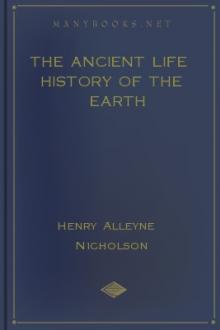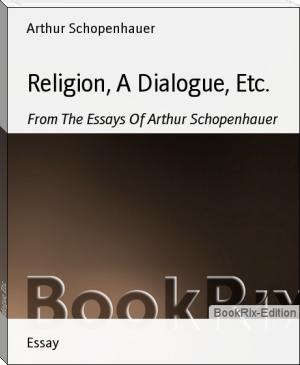Studies in Pessimism, Arthur Schopenhauer [best book clubs .TXT] 📗

- Author: Arthur Schopenhauer
Book online «Studies in Pessimism, Arthur Schopenhauer [best book clubs .TXT] 📗». Author Arthur Schopenhauer
in the ridiculous code of chivalry; and if they are called upon to do so, to seal their belief by dying for it, and seriously to regard a king as a being of a higher order.
Again, our expressions of politeness, the compliments we make, in particular, the respectful attentions we pay to ladies, are a matter of training; as also our esteem for good birth, rank, titles, and so on. Of the same character is the resentment we feel at any insult directed against us; and the measure of this resentment may be exactly determined by the nature of the insult. An Englishman, for instance, thinks it a deadly insult to be told that he is no gentleman, or, still worse, that he is a liar; a Frenchman has the same feeling if you call him a coward, and a German if you say he is stupid.
There are many persons who are trained to be strictly honorable in regard to one particular matter, while they have little honor to boast of in anything else. Many a man, for instance, will not steal your money; but he will lay hands on everything of yours that he can enjoy without having to pay for it. A man of business will often deceive you without the slightest scruple, but he will absolutely refuse to commit a theft.
Imagination is strong in a man when that particular function of the brain which enables him to observe is roused to activity without any necessary excitement of the senses. Accordingly, we find that imagination is active just in proportion as our senses are not excited by external objects. A long period of solitude, whether in prison or in a sick room; quiet, twilight, darkness - these are the things that promote its activity; and under their influence it comes into play of itself. On the other hand, when a great deal of material is presented to our faculties of observation, as happens on a journey, or in the hurly-burly of the world, or, again, in broad daylight, the imagination is idle, and, even though call may be made upon it, refuses to become active, as though it understood that that was not its proper time.
However, if the imagination is to yield any real product, it must have received a great deal of material from the external world. This is the only way in which its storehouse can be filled. The phantasy is nourished much in the same way as the body, which is least capable of any work and enjoys doing nothing just in the very moment when it receives its food which it has to digest. And yet it is to this very food that it owes the power which it afterwards puts forth at the right time.
* * * * *
Opinion is like a pendulum and obeys the same law. If it goes past the centre of gravity on one side, it must go a like distance on the other; and it is only after a certain time that it finds the true point at which it can remain at rest.
* * * * *
By a process of contradiction, distance in space makes things look small, and therefore free from defect. This is why a landscape looks so much better in a contracting mirror or in a camera obscura , than it is in reality. The same effect is produced by distance in time. The scenes and events of long ago, and the persons who took part in them, wear a charming aspect to the eye of memory, which sees only the outlines and takes no note of disagreeable details. The present enjoys no such advantage, and so it always seems defective.
And again, as regards space, small objects close to us look big, and if they are very close, we may be able to see nothing else, but when we go a little way off, they become minute and invisible. It is the same again as regards time. The little incidents and accidents of every day fill us with emotion, anxiety, annoyance, passion, as long as they are close to us, when they appear so big, so important, so serious; but as soon as they are borne down the restless stream of time, they lose what significance they had; we think no more of them and soon forget them altogether. They were big only because they were near.
* * * * *
Joy and sorrow are not ideas of the mind, but affections of the will, and so they do not lie in the domain of memory. We cannot recall our joys and sorrows; by which I mean that we cannot renew them. We can recall only the ideas that accompanied them; and, in particular, the things we were led to say; and these form a gauge of our feelings at the time. Hence our memory of joys and sorrows is always imperfect, and they become a matter of indifference to us as soon as they are over. This explains the vanity of the attempt, which we sometimes make, to revive the pleasures and the pains of the past. Pleasure and pain are essentially an affair of the will; and the will, as such, is not possessed of memory, which is a function of the intellect; and this in its turn gives out and takes in nothing but thoughts and ideas, which are not here in question.
It is a curious fact that in bad days we can very vividly recall the good time that is now no more; but that in good days, we have only a very cold and imperfect memory of the bad.
* * * * *
We have a much better memory of actual objects or pictures than for mere ideas. Hence a good imagination makes it easier to learn languages; for by its aid, the new word is at once united with the actual object to which it refers; whereas, if there is no imagination, it is simply put on a parallel with the equivalent word in the mother tongue.
Mnemonics should not only mean the art of keeping something indirectly in the memory by the use of some direct pun or witticism; it should, rather, be applied to a systematic theory of memory, and explain its several attributes by reference both to its real nature, and to the relation in which these attributes stand to one another.
* * * * *
There are moments in life when our senses obtain a higher and rarer degree of clearness, apart from any particular occasion for it in the nature of our surroundings; and explicable, rather, on physiological grounds alone, as the result of some enhanced state of susceptibility, working from within outwards. Such moments remain indelibly impressed upon the memory, and preserve themselves in their individuality entire. We can assign no reason for it, nor explain why this among so many thousand moments like it should be specially remembered. It seems as much a matter of chance as when single specimens of a whole race of animals now extinct are discovered in the layers of a rock; or when, on opening a book, we light upon an insect accidentally crushed within the leaves. Memories of this kind are always sweet and pleasant.
* * * * *
It occasionally happens that, for no particular reason, long-forgotten scenes suddenly start up in the memory. This may in many cases be due to the action of some hardly perceptible odor, which accompanied those scenes and now recurs exactly same as before. For it is well known that the sense of smell is specially effective in awakening memories, and that in general it does not require much to rouse a train of ideas. And I may say, in passing, that the sense of sight is connected with the understanding,[1] the sense of hearing with the reason,[2] and, as we see in the present case, the sense of smell with the memory. Touch and Taste are more material and dependent upon contact. They have no ideal side.
[Footnote 1: Wierfache Wurzel § 21.]
[Footnote 2: Parerga vol. ii, § 311.]
* * * * *
It must also be reckoned among the peculiar attributes of memory that a slight state of intoxication often so greatly enhances the recollection of past times and scenes, that all the circumstances connected with them come back much more clearly than would be possible in a state of sobriety; but that, on the other hand, the recollection of what one said or did while the intoxication lasted, is more than usually imperfect; nay, that if one has been absolutely tipsy, it is gone altogether. We may say, then, that whilst intoxication enhances the memory for what is past, it allows it to remember little of the present.
* * * * *
Men need some kind of external activity, because they are inactive within. Contrarily, if they are active within, they do not care to be dragged out of themselves; it disturbs and impedes their thoughts in a way that is often most ruinous to them.
* * * * *
I am not surprised that some people are bored when they find themselves alone; for they cannot laugh if they are quite by themselves. The very idea of it seems folly to them.
Are we, then, to look upon laughter as merely O signal for others - a mere sign, like a word? What makes it impossible for people to laugh when they are alone is nothing but want of imagination, dullness of mind generally - [Greek: anaisthaesia kai bradutaes psuchaes], as Theophrastus has it.[1] The lower animals never laugh, either alone or in company. Myson, the misanthropist, was once surprised by one of these people as he was laughing to himself. Why do you laugh ? he asked; there is no one with you. That is just why I am laughing , said Myson.
[Footnote 1: Characters , c. 27.]
Again, our expressions of politeness, the compliments we make, in particular, the respectful attentions we pay to ladies, are a matter of training; as also our esteem for good birth, rank, titles, and so on. Of the same character is the resentment we feel at any insult directed against us; and the measure of this resentment may be exactly determined by the nature of the insult. An Englishman, for instance, thinks it a deadly insult to be told that he is no gentleman, or, still worse, that he is a liar; a Frenchman has the same feeling if you call him a coward, and a German if you say he is stupid.
There are many persons who are trained to be strictly honorable in regard to one particular matter, while they have little honor to boast of in anything else. Many a man, for instance, will not steal your money; but he will lay hands on everything of yours that he can enjoy without having to pay for it. A man of business will often deceive you without the slightest scruple, but he will absolutely refuse to commit a theft.
Imagination is strong in a man when that particular function of the brain which enables him to observe is roused to activity without any necessary excitement of the senses. Accordingly, we find that imagination is active just in proportion as our senses are not excited by external objects. A long period of solitude, whether in prison or in a sick room; quiet, twilight, darkness - these are the things that promote its activity; and under their influence it comes into play of itself. On the other hand, when a great deal of material is presented to our faculties of observation, as happens on a journey, or in the hurly-burly of the world, or, again, in broad daylight, the imagination is idle, and, even though call may be made upon it, refuses to become active, as though it understood that that was not its proper time.
However, if the imagination is to yield any real product, it must have received a great deal of material from the external world. This is the only way in which its storehouse can be filled. The phantasy is nourished much in the same way as the body, which is least capable of any work and enjoys doing nothing just in the very moment when it receives its food which it has to digest. And yet it is to this very food that it owes the power which it afterwards puts forth at the right time.
* * * * *
Opinion is like a pendulum and obeys the same law. If it goes past the centre of gravity on one side, it must go a like distance on the other; and it is only after a certain time that it finds the true point at which it can remain at rest.
* * * * *
By a process of contradiction, distance in space makes things look small, and therefore free from defect. This is why a landscape looks so much better in a contracting mirror or in a camera obscura , than it is in reality. The same effect is produced by distance in time. The scenes and events of long ago, and the persons who took part in them, wear a charming aspect to the eye of memory, which sees only the outlines and takes no note of disagreeable details. The present enjoys no such advantage, and so it always seems defective.
And again, as regards space, small objects close to us look big, and if they are very close, we may be able to see nothing else, but when we go a little way off, they become minute and invisible. It is the same again as regards time. The little incidents and accidents of every day fill us with emotion, anxiety, annoyance, passion, as long as they are close to us, when they appear so big, so important, so serious; but as soon as they are borne down the restless stream of time, they lose what significance they had; we think no more of them and soon forget them altogether. They were big only because they were near.
* * * * *
Joy and sorrow are not ideas of the mind, but affections of the will, and so they do not lie in the domain of memory. We cannot recall our joys and sorrows; by which I mean that we cannot renew them. We can recall only the ideas that accompanied them; and, in particular, the things we were led to say; and these form a gauge of our feelings at the time. Hence our memory of joys and sorrows is always imperfect, and they become a matter of indifference to us as soon as they are over. This explains the vanity of the attempt, which we sometimes make, to revive the pleasures and the pains of the past. Pleasure and pain are essentially an affair of the will; and the will, as such, is not possessed of memory, which is a function of the intellect; and this in its turn gives out and takes in nothing but thoughts and ideas, which are not here in question.
It is a curious fact that in bad days we can very vividly recall the good time that is now no more; but that in good days, we have only a very cold and imperfect memory of the bad.
* * * * *
We have a much better memory of actual objects or pictures than for mere ideas. Hence a good imagination makes it easier to learn languages; for by its aid, the new word is at once united with the actual object to which it refers; whereas, if there is no imagination, it is simply put on a parallel with the equivalent word in the mother tongue.
Mnemonics should not only mean the art of keeping something indirectly in the memory by the use of some direct pun or witticism; it should, rather, be applied to a systematic theory of memory, and explain its several attributes by reference both to its real nature, and to the relation in which these attributes stand to one another.
* * * * *
There are moments in life when our senses obtain a higher and rarer degree of clearness, apart from any particular occasion for it in the nature of our surroundings; and explicable, rather, on physiological grounds alone, as the result of some enhanced state of susceptibility, working from within outwards. Such moments remain indelibly impressed upon the memory, and preserve themselves in their individuality entire. We can assign no reason for it, nor explain why this among so many thousand moments like it should be specially remembered. It seems as much a matter of chance as when single specimens of a whole race of animals now extinct are discovered in the layers of a rock; or when, on opening a book, we light upon an insect accidentally crushed within the leaves. Memories of this kind are always sweet and pleasant.
* * * * *
It occasionally happens that, for no particular reason, long-forgotten scenes suddenly start up in the memory. This may in many cases be due to the action of some hardly perceptible odor, which accompanied those scenes and now recurs exactly same as before. For it is well known that the sense of smell is specially effective in awakening memories, and that in general it does not require much to rouse a train of ideas. And I may say, in passing, that the sense of sight is connected with the understanding,[1] the sense of hearing with the reason,[2] and, as we see in the present case, the sense of smell with the memory. Touch and Taste are more material and dependent upon contact. They have no ideal side.
[Footnote 1: Wierfache Wurzel § 21.]
[Footnote 2: Parerga vol. ii, § 311.]
* * * * *
It must also be reckoned among the peculiar attributes of memory that a slight state of intoxication often so greatly enhances the recollection of past times and scenes, that all the circumstances connected with them come back much more clearly than would be possible in a state of sobriety; but that, on the other hand, the recollection of what one said or did while the intoxication lasted, is more than usually imperfect; nay, that if one has been absolutely tipsy, it is gone altogether. We may say, then, that whilst intoxication enhances the memory for what is past, it allows it to remember little of the present.
* * * * *
Men need some kind of external activity, because they are inactive within. Contrarily, if they are active within, they do not care to be dragged out of themselves; it disturbs and impedes their thoughts in a way that is often most ruinous to them.
* * * * *
I am not surprised that some people are bored when they find themselves alone; for they cannot laugh if they are quite by themselves. The very idea of it seems folly to them.
Are we, then, to look upon laughter as merely O signal for others - a mere sign, like a word? What makes it impossible for people to laugh when they are alone is nothing but want of imagination, dullness of mind generally - [Greek: anaisthaesia kai bradutaes psuchaes], as Theophrastus has it.[1] The lower animals never laugh, either alone or in company. Myson, the misanthropist, was once surprised by one of these people as he was laughing to himself. Why do you laugh ? he asked; there is no one with you. That is just why I am laughing , said Myson.
[Footnote 1: Characters , c. 27.]
Free e-book «Studies in Pessimism, Arthur Schopenhauer [best book clubs .TXT] 📗» - read online now
Similar e-books:





Comments (0)